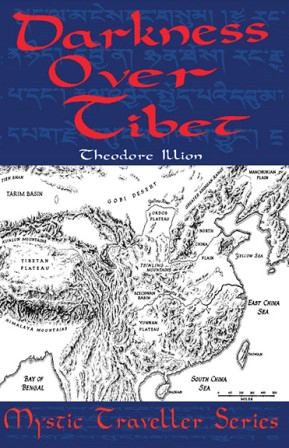Part of the Casswiki article series Books

Darkness Over Tibet is a book by Theodore Illion, first published in 1937, an allegoric account of the underground city in Tibet during the course of Illion’s journey. He relates his experiences with his interactions with a number of individuals in the mentioned city. At first, he found there all is well and everything seems quite peaceful, but as it turned out later, nothing is as it seems. There is a known darkness and “unseen” darkness. This book reveals the “unseen” darkness where as the so-called “light” is actually the darkness in disguise.
The stories in this book are clearly symbolic, but it may have some basis in fact and probably capture some of the spirit of popular belief in the region. Determining the account’s precise accuracy is difficult from a Western standpoint.
What is more important than the literal accuracy of Illion’s account is, however, the way in which he underlines basic principles. The following are the high points of his narrative:
-
Spiritual development does not bring one to blissful peace. It is a road of constant struggle fraught with pitfalls at each level. The light and dark follow each other closely and deceptions become increasingly subtle.
-
Not all life is on an upward path. Many life forms are in fact on a descending path, symbolized in the animal world by rats and the like. The same applies to at the human and higher levels. The psychopath would be a human level representation of the descending path. Generally, the descending path tends towards materialization of spirit, use of spiritual forces at the service of their material goals. This is in line with the idea of service to self from Ra and Cassiopaeans.
-
The deceptions of the dark forces are sometimes very subtle and can take the form of great seeming virtue, understanding and wisdom. One among these is for man to think himself God and and refuse to act his part. For example, a character in a theater play in the book thought himself enlightened and since all created are God’s creatures, he saw fit to share his house and food with rats, to the effect of starving his family. He was spiritually proud and in his pride deceived.
Illion mentions other archetypal stories, including a school of black magicians where the students do not even at first guess the nature of the school, thinking themselves on a mission for good, administering karma for the world’s leaders, guiding destinies with a “strong and benevolent hand.” Still, this power hungry and self-important lot were nothing but the minions of the actual forces of darkness, perpetrating human sacrifice and other such activities for their own gain,
Yet another example is a teacher who warns people against blindly following leaders and of practicing magic, all in good sense but then advises them to destroy any individual consciousness and to return to an in-differentiated state of non-ego, effectually committing suicide and reversing the Creator’s work, all for personal happiness.
Illion’s greatest merit is showing the dark side of many seemingly reasonable and even virtuous ideas. The Cassiopaeans have commented that Illion’s account is an allegory for spiritual truths and 4th density concepts.
Further readings
- Darkness Over Tibet – Part 1
- Darkness Over Tibet – Part 2
- Darkness Over Tibet – Part 3
- Cassiopaea Forum: Theodore Illion - Darkness Over Tibet
See also
- Theodore Illion
- Fourth density service to self being
